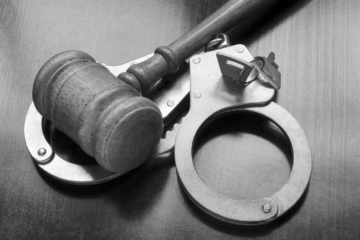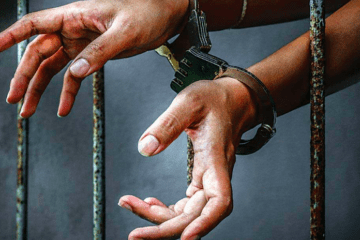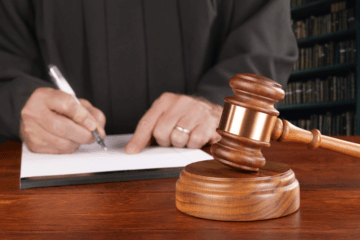Introduction
The Cr.P.C. divides criminal trial into sessions trial and magistrate trial. Whether an offence is triable by a Court of Session or Magistrate’s Court is specified under the First Schedule of the Code. When a District Court exercises its jurisdiction over criminal matters it is referred as a Court of Session. Section 9 of the Code says that the State Government shall establish a Court of Sessions in every division. Trial before a Court of Session is given in the Chapter XVIII of the Code of Criminal Procedure from Sections 225 to 237. Although only section 225 to 236 deals with the actual trial. Section 237 of this Code deals with the procedure of cases instituted under section 199(2).
Trial to be conducted by Prosecutor
Section 225 says that every trial before a Court of Sessions, the prosecution shall be conducted by a Public Prosecutor.
A Public Prosecutor as defined under section 24 means a person appointed by either the Central Government or State Government, after consultation with the High Court for conducting any prosecution, appeal, or other proceedings on behalf of the Central Government or State Government.
Opening case for Prosecution
Section 226 of the Code states that when an accused is brought before the Court in pursuance of a commitment of the case under section 209, the prosecutor will open the case by describing the charge against the accused and stating by what evidence he proposed to prove the guilt of the accused.
Section 209 of the Code says that when a case is brought before the Magistrate and it appears to him that that case triable exclusively by the Court of Sessions, he shall send records, documents and articles to the Court. The Magistrate shall remand the accused to custody or grant him bail, and will notify the Public Prosecutor. The Public Prosecutor, then opens his case before the Court of Sessions by describing what charge is brought against the accused and by stating what evidence he has to prove the guilt of the accused.
Discharge
Section 227 talks about discharge. If, upon consideration of the record of the case and the documents submitted therewith, and after hearing the submissions of the accused and the prosecution in this behalf, the Judge considers that there is not sufficient ground for proceeding against the accused, he shall discharge the accused and record his reasons for doing so.
If the Judge, after taking into consideration all the documents and records submitted and after hearing the prosecutor is of the view that there is no sufficient ground to proceed against the accused, he shall discharge him by recording the reason for discharge. In Sushil Ansal v. State[1]it was held that an order of discharge may be passed only where Court is almost certain that there is no prospect of conviction and that time of the Court need not be wasted holding a trial. Before framing the charge, the Court need not undertake an elaborate enquiry. It only needs to consider whether no sufficient grounds exist for proceeding against the accused. If it is so found, the accused will be discharged, otherwise charge shall be framed and the accused will be put to trial. It can be said that discharge is the suspension of trial.
The Supreme Court in the case of Union of India v. Prafulla Kumar Samal[2] laid down the following principals that Judges need to keep in mind while exercising the power of discharge:
- The Judge while considering the question of discharging the accused has undoubted power to weigh and scale the evidence for the purpose of finding whether the prima facie case against the accused has been made out or not.
- If a material in case shows grave suspicion against the accused which has not been properly explained, the court will be justified in framing charge and proceeding with the trial.
- The test to determine a prima facie case depends on case to case and a universal rule cannot be applied. In such cases the Judge has discretion to try the case.
- Court can in no circumstance act merely as post office or a mouthpiece of the prosecution, but has to consider the broad probabilities of the case, the total effect of the evidence and documents produced before it. The Judge should make a roving inquiry into the pros and cons of the matter and weigh the evidence in conducting the trial.
Framing of Charge
Section 228 talks of framing of charges.
(1) If, after such consideration and hearing as aforesaid, the Judge, is of opinion that there is ground for presuming that the accused has committed an offence which –
(a) is not exclusively triable by the Court of Session, he may, frame a charge against the accused and, by order, transfer the case for trial to the Chief Judicial Magistrate, and thereupon the Chief Judicial Magistrate shall try the offence in accordance with the procedure for the trial of warrant-cases instituted on a police report;
(b) is exclusively triable by the Court, he shall frame in writing a charge against the accused.
(2) Where the Judge frames any charge under clause (b) of sub-section (1), the charge shall be read and explained to the accused and the accused shall be asked whether he pleads guilty of the offence charged or claims to be tried.
If the Sessions Judge is of the opinion that an offence has been committed but that offence is not exclusively triable by him, he frames the charge and then transfers the case to the Chief Judicial Magistrate. Whereas, if the offence is triable by his Court, he frames a charge in writing, against the accused. The charge framed shall then be read and explained to the accused and he shall be asked whether he pleads guilty of the offence he has been charged with or wants to be tried. Mere reading of the charge is also not sufficient. It should be explained in a way that the accused understands the nature of the charge to which he is called upon to plead.
It is important that before framing a charge, the Court should properly evaluate the material and documents placed before it and apply its mind to find out whether any fact in FIR or statements of witnesses disclosed the ingredients of the alleged offence. In short, a prima facie case should be made out and there must be grounds for forming the opinion that an offence has been committed by the accused.
At the time of framing of charge, there must be proper “hearing” and “consideration”, otherwise there is a possibility that the charges would be framed in a routine and mechanical manner which may ultimately lead to a situation where charges are framed either inadequately or inappropriately defeating the cause of justice.[3]
Conviction of Plea of Guilty
Section 229 deals with conviction on plea of guilty.
If the accused pleads guilty, the Judge shall record the plea and may, in his discretion, convict him thereon.
If after explaining the charges to the accused, he pleads guilty of commission of the acts alleged against him, the judge may, in his discretion, convict him. The term ‘may, in his discretion, convict him’ means that the Court has the discretion to convict the accused when he pleads guilty or to proceed with the trial.
Date for Prosecution Evidence
Section 230 deals with date for prosecution evidence.
If the accused refuses to plead, or does not plead, or claims to be tried or is not convicted under section 229, the Judge shall fix a date for the examination of witnesses, and may, on the application of the prosecution, issue any process for compelling the attendance of any witness or the production of any document or other thing.
In case the accused refuses to plead, or claims to be tried, or he pleads guilty but the Judge in his discretion does not convict him, in all the above cases, the Judge fixes a date for examination of witnesses and if necessary, issues process to compel attendance of witnesses or production of document or other thing. In other words, Judges may also issue summon to call upon any witness or to produce documents, etc.
Evidence for Prosecution
Section 231 deals with evidence for prosecution.
(1) On the date so fixed, the Judge shall proceed to take all such evidence as may be produced in support of the prosecution.
(2) The Judge may, in his discretion, permit the cross-examination of any witness to be deferred until any other witness or witnesses have been examined or recall any witness for further cross-examination.
On the date fixed by the Judge, the prosecution shall produce all the material evidence available to it for unfolding its case. The Judge can permit cross-examination of any witness to be deferred until other witnesses are examined or recall any other witness for cross-examination.
Acquittal
Section 232 talks about acquittal.
If, after taking the evidence for the prosecution, examining the accused and hearing the prosecution and the defence on the point, the Judge considers that there is no evidence that the accused committed the offence, the Judge shall record an order of acquittal.
The Judge records an order of acquittal if after:
- Taking the evidence for prosecution,
- Examining the accused, and
- Hearing the prosecution and the defence on that point
He considers that there is no satisfactory and trustworthy evidence that the accused has committed the alleged offence.
Entering upon Defence
Section 233 talks for entering upon defence.
(1) Where the accused is not acquitted under section 232, he shall be called upon to enter on his defence and adduce any evidence he may have in support thereof.
(2) If the accused puts in any written statement, the Judge shall file it with the record.
(3) If the accused applies for the issue of any process for compelling the attendance of any witness or the production of any document or thing, the Judge shall issue such process unless he considers, for reasons to be recorded, that such application should be refused on the ground that it is made for the purpose of vexation or delay or for defeating the ends of justice.
If the accused is not acquitted under section 232 of the Code, the Judge will call upon him to enter on his defence. This is an essential part of the trial and an omission of this can be considered as failure of justice.
The accused may apply for issue of process to compel attendance of witness or production of documents or things and the Judge, unless he considers the application to be vexatious or made for the purpose of delay or defeating the ends of justice, shall issue such process.
Arguments
Section 234 talks about arguments.
When the examination of the witnesses (if any) for the defence is complete, the prosecutor shall sum up his case and the accused or his pleader shall be entitled to reply:
Provided that where any point of law is raised by the accused or his pleader, the prosecution may, with the permission of the Judge, make his submissions with regard to such point of law.
Every accused person may of right be defended by a pleader of his choice. The word reply here connotes that the accused or his pleader shall reply to the whole case. However, if a point of law is raised by the accused or his pleader, the Judge shall permit the prosecution to make submissions with regard to such point of law.
Judgement of acquittal or conviction
Section 235 talks about the judgement.
(1) After hearing arguments and points of law (if any), the Judge shall give a judgment in the case.
(2) If the accused is convicted, the Judge shall, unless he proceeds in accordance with the provisions of section 360, hear the accused on the questions of sentence, and then pass sentence on him according to law.
If any arguments are made regarding the law point, the Judge shall hear those arguments and the give a judgement in the case.
The provision of clause (2) envisages that after a Court holds a person guilty, it must consider the question of sentencing in the light of various factors such as prior criminal record of the offender, his age, employment, educational background, home life, sobriety and social adjustment, emotional and mental condition, and the prospect of his returning to normal path of conformity with the law. It was therefore considered that the accused as well as the prosecution should be given an opportunity to put forward their viewpoints on the question of the sentence. This sub-section requires the Court to give a hearing to the accused on the question of the sentence.
Previous Conviction
Section 236 talks about previous conviction.
In a case where a previous conviction is charged under the provisions of sub-section (7) of section 211, and the accused does not admit that he has been previously convicted as alleged in the charge, the Judge may, after he has convicted the said accused under section 229 or section 235, take evidence in respect of the alleged previous conviction, and shall record a finding thereon:
Provided that no such charge shall be read out by the Judge nor shall the accused be asked to plead thereto nor shall the previous conviction be referred to by the prosecution or in any evidence adduced by it, unless and until the accused has been convicted under section 229 or section 235.
Where a previous conviction is charged under section 211(7) of the Criminal Procedure Code, and the accused refuses to admit it, the judge may, after conviction, take evidence regarding that previous conviction.
[1] Sushil Ansal v. State, 2002 CrLJ 1369 (Del).
[2] Union of India v. Prafulla Kumar Samal (1979) SCC 4: 1979 SCC (Cri) 609, 613
[3] Public Prosecutor, A.P. High Court v. Patharlauka Venkateshwarlu, 2002 CrLJ 3145 (AP)




0 Comments